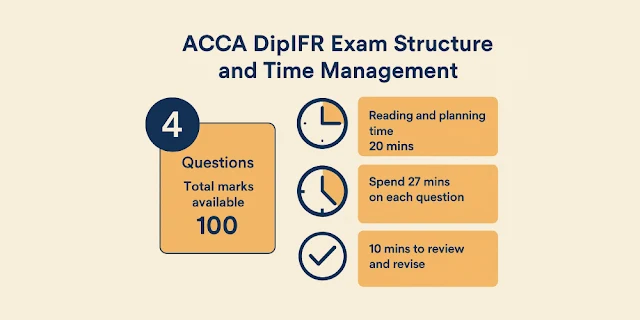ACCA Dip-IFRS Exam Structure & Time Management Tips
To
overcome the above hurdles or challenges, first important step is to understand
the exam structure or structure of the question paper. Second step is to
understand how the examination utility looks on a computer machine and how to
navigate through the various exhibits in question scenario and how to answer
without losing time in navigation. The third most important and last step is to
practice on such platform in order to reduce time required to solve the
question paper. In this blog, we’ll focus on the first step to overcome the
hurdles i.e. understanding structure of the exam.
Let
us break down and analyse the exam paper pattern and try to understand what
ACCA on a broad level expects from the students of Diploma IFRS
examination.
This will help students to plan their revision based on the expectations of
examiner and more importantly to plan 3 hours of examination. Student has 3
hours and 15 minutes at his disposal. Student can use it as per his own
convenience for reading questions and writing answers. However, our suggestion
is to keep total 15 minutes for reading and planning the question paper and
another 10 minutes as a buffer. Thus, out of 195 minutes, remaining 170 minutes
can be utilised to solve the question paper. Thus, 1.7 minutes per mark can be
used as a very broad level guideline for the time management. However,
considering the level of difficulty of a particular question, this time may be revised.
Exam
consists of 100 marks with 4 questions, each attracting 25 marks. All questions
are compulsory and no alternative is available for any question.
Question one:
This
question will involve the preparation of a consolidated financial statement, as examinable within the
syllabus. This question will often include issues that will need to be
addressed prior to performing the consolidation procedures for e.g. procedures
mentioned in IFRS 3 – Business Combinations viz. calculation of purchase
consideration, NCI, goodwill etc. Generally, these issues will relate to the
financial statements of the parent entities prior to their consolidation. A key purpose of this question is to assess
technical consolidation skills. However, the question may also require
candidates to adjust for transactions that have been incorrectly or incompletely
accounted for in the financial statements of group entities (usually the parent
entity). In order to make these adjustments candidates will need to apply the
provisions of relevant IFRS Standards. In Question one, the focus will
primarily on application rather than explanation. No explanations are expected in the question number 1.
Question two:
This
question will often be related to a scenario in which questions arise regarding
the appropriate accounting treatment and/or disclosure of a range of issues. In
this question candidates may be asked to
comment on management’s chosen accounting treatment and determine a more
appropriate one, based on circumstances described in the question. This
question will also contain an ethical
and professional component related to the accounting treatment that is
being examined.
Question three:
This
question will usually deal with one or
two IFRS Standards in some detail. Such a question would require
candidates to describe key features of the IFRS Standard and apply it to two or
more situations that the question describes. In contrast with Question 1, there
will be a limited number of marks available for technical preparation of
financial statements extracts and the majority of marks are available for
identifying and quantifying the appropriate adjustments. However, it is
expected that students can explain how these adjustments will affect line items
in the financial statements.
Question four:
This
question will often present candidates with a scenario or a range of scenarios
for which the correct financial reporting treatment is complex or uncertain.
Often the question will place the candidate in a ‘real-life’ role, for example
chief accountant reporting to the chief executive officer or senior accountant
supervising an assistant. The question frequently requires candidates to
address a series of questions that have been posed by the other party in the
scenario. The question will often ask candidates to present a reply or report
that deals with the appropriate financial reporting of the issues raised in the
scenario. The primary skill in this question is identifying and describing the
issues, rather than the detailed computation of numbers.
Questions
2, 3 and 4 will
be more about identification and explanation of financial reporting issues
rather than of financial statements preparation. Practicing these questions
from the past exam questions is very good exam preparation as generally
candidates find the narrative style questions more challenging than the
numerical style of question one. These past papers continue to be relevant, but
students should bear in mind that sometimes additional query or explanation of
an additional IFRS Standard can be demanded.
We
hope knowing the ACCA Dip-IFRS exam structure will help you approach the exam
with a clear plan. Understanding the types of questions, marks distribution,
and how the paper is set
will make it easier for you to focus on your study and manage your time during
the exam.
Best wishes from Team FinPro!
Thank you for reading our blog, stay tuned for such
insightful tips.
Thank you for reading our blog. Stay tuned for more such insightful tips.
If you have any questions or need assistance, feel free to contact us.


Comments
Post a Comment